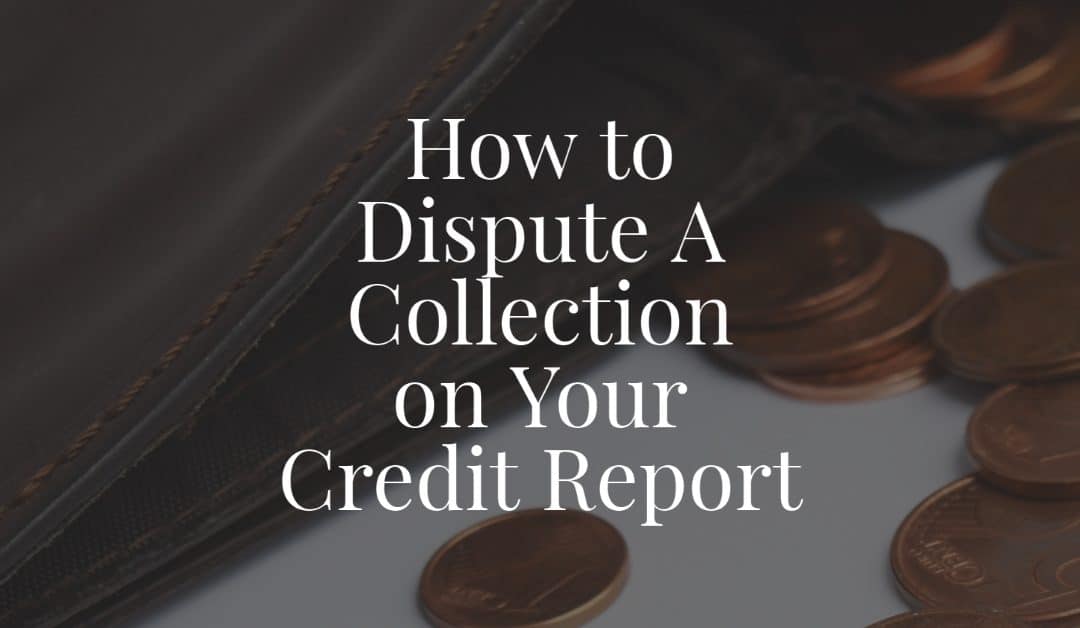Businesses can sell overdue debt to a debt collection agency that can report debt to a Nationwide Credit Reporting Agency. But what if the credit reporting agency reports inaccurate and harmful information about your creditworthiness? Learn what to do to dispute a collection account on your credit report.
Why Dispute an Inaccurate Collection on Your Credit Report?
With a lowered credit score, any loans you take out have higher interest rates and may contain extra transaction fees or penalties. You are at greater risk for obtaining a sub-prime loan, otherwise known as a predatory loan. These loans can last double the number of years and cost twice as much as a prime rate loan.
You may also struggle with getting an apartment or home lease. Credit scores can even affect your ability to get a job.
Dispute Early for the Best Outcome
It helps to take appropriate action before inaccurate information surfaces on your credit report. By law, debt collectors must provide detailed disclosures about debt to inform you. You have 30 days from the date you receive notice of the debt before the collections can hit your credit report. Use this time wisely to take these actions:
Look for a Statement of Debt
First off, you should receive a statement from the debt collector that indicates the communication is from a collector and is about debt. Knowing this information makes it possible to assert your rights under the FDCPA’s consumer protections regarding debt collection.
If you had not received this letter from a collection agency before it went on your credit report, there may be illegal activity. Suppose a debt collections agency sends an inaccurate debt to the credit reporting agencies but never notifies you. In that case, you can report them to the CFPB and contact a consumer rights attorney to sue for damages.
Request Information About the Original Creditor
You need to know where the debt came from initially. When a debt collection agency buys your debt from a business, you may not recognize this new creditor’s name. Always ask what company you originally owed so that you can look at your financial records and see if you owe the debt.
Dispute the Debt
You always have the right to dispute the debt. This right is essential because many debts may not even be yours. Often, there is confusion in billing departments and also when debt is bought or sold. You may not owe the debt, or they may even have the wrong account.
If the debt is older than the statute of limitations in your state, dispute this and DO NOT PAY. If you pay a debt past the statute of limitations for your state, you can reopen an old obligation and cause the time cycle to start fresh. Don’t ever pay “zombie debt.”
Read more about your consumer rights under the Fair Debt Collection Practices Act (FDCPA).
Dispute Debt on Your Credit Report
If the debt is already on your credit report, you probably did not dispute in time to prevent the wrong information from going on your record. However, the dispute process is still crucial.
First, take the steps above to work with the debt collection agency to remove the inaccuracy. If they do not remove the information promptly, file a dispute with the credit reporting agency that is reporting the wrong debt information at one of the following links:
Credit Reporting Bureau Dispute Process
The dispute process is similar for each credit reporting bureau. You will communicate the reason for your dispute and provide proof or copies of your bills or communications with the debt collections agency or original creditor. Make sure your dispute went through. Usually they will send an email accepting your dispute request. After you file, give the credit reporting agency a few weeks to process your dispute.
Your best chance for success is to have reliable information about your attempts to pay or clear the debt. Submit all corroborating evidence that you have done everything you can to resolve the dispute. If the debt collections agency is in the wrong, explain why clearly and concisely. Include all proof: receipts, emails, texts, pictures of the account online, the times and contents of any phone communications, etc.
Credit Reporting Agencies Fall Short
The Consumer Financial Protection Bureau’s primary concern is protecting consumers from fraudulent or predatory businesses. This past year, in 2020, they received more complaints from consumers about inaccurate information on their credit and consumer reports than in 2019. Most of these complaints were about the three largest Nationwide Credit Reporting Agencies (NCRAs): Equifax, Experian, and TransUnion.
According to the CFPB, the credit reporting agencies stopped providing complete and accurate responses to many of the complaints filed in 2020. They also failed to provide any detailed steps taken to address the issues that consumers raised in their complaints. (1)
If your complaints are falling on deaf ears, you are not alone. Seek out an experienced consumer rights attorney to make your voice heard.
Get Help
If you need to dispute a collection on your credit report that is threatening your rights as a consumer, contact us at Law Zebra to find out more about your rights. Our network of experienced and knowledgeable consumer rights protection attorneys understand the complex laws surrounding predatory business practices and outright fraud. We stand ready to help you resolve any conflicts you face and restore your good credit and reputation. Get in touch with us today to get started.
- https://files.consumerfinance.gov/f/documents/cfpb_2020-consumer-response-annual-report_03-2021.pdf

